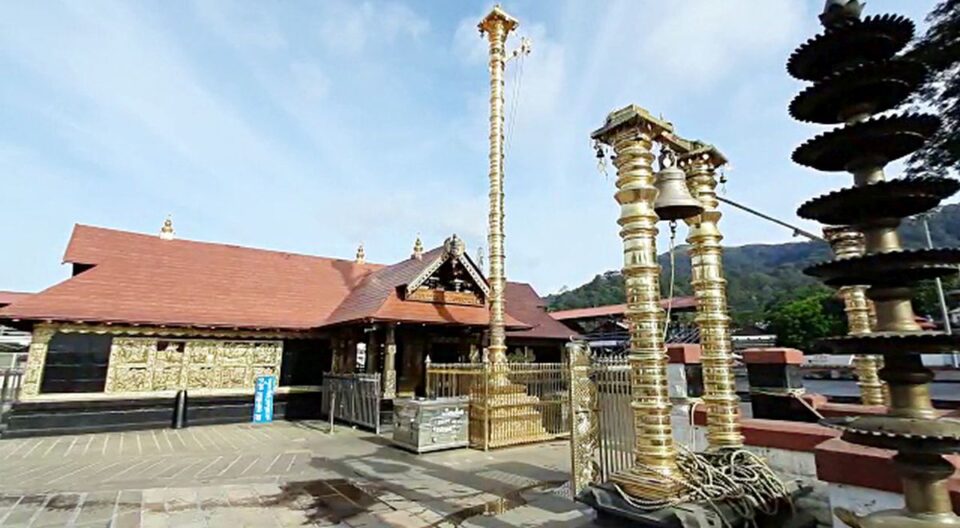‘So far we have paid our salaries and pension in full because we had some reserve fund.’
‘But we cannot afford to do so for more than another three months.’
IMAGE: The Lord Ayyappa temple in Sabarimala. Photograph: ANI Photo
Not only industries, even religious shrines are suffering because of the pandemic.
With devotees kept away from temples in these last five months of lockdown, not just small temples, even the richest temples in India like in Tirupati and Sabarimala are finding it difficult to manage their day-to-day affairs.
Desperate times require desperate measures. That was why the Travancore Devaswom Board decided to pledge the gold its temples have with the Reserve Bank of India to earn some revenue.
According to the World Gold Council, the gold lying with all the religious trusts in the country is worth a whopping $1 trillion!
“In January itself we took an in principle decision to hand over our gold to the Reserve Bank and get the 2.5% interest from the central bank,” N Vasu, president, Travancore Devaswom Board, below, tells Shobha Warrier/KhabriBaba.com. The first of a two-part interview:
How much has the pandemic and the lockdown affected the temples in Kerala?
There are 1,250 temples under the Travancore Devaswom Board, including Sabarimala.
For the past six months, all these temples have remained closed due to the pandemic. Sabarimala was also closed to devotees.
In fact, we had cancelled not just the Vishu and the annual festival, but even the monthly puja at Sabarimala.
As a result of this, we had sustained a loss of Rs 300 crores (Rs 3 billion).
You should also understand that we have around 5,000 employees and 4,000 pensioners under the Travancore Devaswom Board.
When we need at least Rs 50 crores (Rs 500 million) per month to pay the salaries and pension, and other administrative affairs including the daily puja, we have not been getting a single paisa for the last six months.
Have you been able to pay the salaries to all the employees and also the pension in these last six months?
So far, we have paid the salary and pension in full because we had some reserve fund. But we cannot afford to do so for more than another three months.
By the end of this year, our funds will be empty.
Did the Sabarimala temple contribute the maximum to the Devaswom Board?
Yes. More than 50% of our income comes from Sabarimala alone, which is around Rs 350 crores (Rs 3.5 billion), while we get almost an equal amount from all the other temples put together.
I have heard that most of the temples in small towns are managed from the income you get from big temples. Is it true?
Yes. Out of these 1,250 temples, we get surplus income only from 60 temples.
So, we are managing the affairs of the more than 1,000 small temples from whatever we get from Sabarimala and these 60 temples.
It was reported that the Travancore Devaswom Board and many other rich temples in India are planning to pawn the gold they have so that you can tide over the difficult times…
Yes, that is what we are planning to do. In fact, even before the Covid crisis, in January itself, we took an in principle decision to hand over our gold to the Reserve Bank and get the 2.5% interest from the central bank.
This decision had nothing to do with the pandemic.
Was it because the gold was remaining idle in some vaults?
Exactly. We had three sets of items in gold; one is the gold ornaments which we use to adorn the deities on a day to day basis or on special occasions.
We had no plans to pledge them; they would remain in the temple itself.
Then, many temples have several antique items. These things will not go to the bank.
There are many gold bars, gold coins, etc also with the temples.
That were offered by the devotees?
Yes. These gold coins, bars, etc were offered by the devotees, and we had proposed to pledge these items in the bank.
These things have been remaining in the temples for decades without providing any revenue to the temples.
We have even started taking stock of the gold in almost all the temples under our board.
Under the Gold Monetisation Policy, we can avail a 2.5% interest against gold loans deposited with the RBI through banks.
Ten days back, the economic affairs secretary had organised a meeting and around 24 temple administrators were invited to the meeting, and 10 of us including the Travancore Devaswom Board participated in the meeting. I would say this meeting was a welcome step.
So 2.5% interest from the gold loans means we can at least get Rs 10 crores (Rs 100 million) annually as interest.




